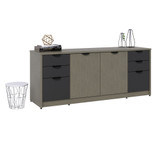In today’s fast-paced world, achieving a healthy work-life balance can often feel like a daunting task when we are working like a dog. With the lines between professional and personal lives increasingly blurred, it’s essential to prioritize both to enhance overall well-being. Here are some effective strategies to help you cultivate a balanced life.
1. Set Clear Boundaries
One of the most critical steps to achieving work-life balance is establishing clear boundaries. Define your work hours and stick to them. Communicate these hours to your colleagues and supervisors to manage expectations. When the workday ends, resist the urge to check emails or finish pending tasks. This separation helps you mentally transition from work mode to personal time.
2. Prioritize Your Tasks
Effective time management is key to maintaining balance. Use tools like to-do lists or digital planners to prioritize tasks based on urgency and importance. By focusing on what truly matters, you can reduce overwhelm and ensure that both work and personal responsibilities are addressed.
3. Embrace Flexibility
If your job allows it, consider adopting a flexible work schedule. Flexibility can enable you to manage personal commitments alongside professional responsibilities. Whether it’s starting your day earlier or taking a longer lunch break, flexibility can significantly improve your quality of life.
4. Make Time for Yourself
Self-care is vital for a balanced life. Schedule regular “me time” into your week—whether it’s a walk, a hobby, or simply relaxing with a book or taking the dog for a walk. This dedicated time helps recharge your batteries and provides a necessary escape from daily stressors.
5. Stay Organized
Clutter can lead to increased stress and decreased productivity. Keep your workspace organized and declutter your home environment regularly. An orderly space promotes a clear mind, making it easier to focus on tasks at hand. Invest in a label maker it will be a gamechanger!
6. Learn to Say No
It’s vital to recognize your limits. Taking on too many commitments can lead to burnout and sickness. Practice saying no to additional responsibilities that don’t align with your goals or values. This will free up time for what truly matters to you.
7. Utilize Technology Wisely
While technology can sometimes distort the lines between work and home, it can also be a powerful tool for maintaining balance. Use productivity apps to help manage tasks, set reminders, and track your time. However, be mindful of your tech use outside of work hours to avoid unnecessary distractions.
8. Nurture Relationships
Strong personal relationships are essential for a fulfilling life. Dedicate time to connect with family and friends. Whether it’s a weekly dinner or a quick phone call, nurturing these relationships provides emotional support and enriches your life.
9. Practice Mindfulness
Incorporating mindfulness practices such as meditation, yoga, or deep-breathing exercises can help reduce stress and increase focus. These practices encourage you to be present in the moment, which can enhance both work performance and personal satisfaction.
10. Reflect and Adjust
Achieving work-life balance is an ongoing process. Regularly reflect on your commitments and assess what is working and what isn’t. Be willing to adjust your approach as your life and responsibilities change. Flexibility is key to maintaining balance over the long term.
Conclusion
Finding a harmonious work-life balance is crucial for your mental and emotional health. By setting boundaries, prioritizing tasks, and making time for yourself and your relationships, you can create a fulfilling and sustainable lifestyle. NJ Office Furniture Depot can help in your work-life balance journey by helping you in creating a workspace that will offer functionality and be aesthetically pleasing to the eye!











102 Responses
Puraburn Nice post. I learn something totally new and challenging on websites
https://berforum.ru/gallery/image/8946-15/
https://vitz.ru/forums/index.php?autocom=gallery&req=si&img=4809
https://mazda-demio.ru/forums/index.php?autocom=gallery&req=si&img=6381
Awesome https://is.gd/tpjNyL
Temukan Kemenangan Menggoda dan Seru di Gates of Olympus Super Scatter : Situs Slot Terpercaya
Gates of Olympus Super Scatter : Situs Slot Online Gacor yang Menjanjikan Kemenangan Besar
https://vitz.ru/forums/index.php?autocom=gallery&req=si&img=5092
https://hrv-club.ru/forums/index.php?autocom=gallery&req=si&img=7164
аккаунты с балансом магазин аккаунтов
купить аккаунт с прокачкой продажа аккаунтов
магазин аккаунтов купить аккаунт
https://vitz.ru/forums/index.php?autocom=gallery&req=si&img=5048
площадка для продажи аккаунтов маркетплейс аккаунтов
продать аккаунт продать аккаунт
услуги по продаже аккаунтов покупка аккаунтов
маркетплейс для реселлеров купить аккаунт с прокачкой
продажа аккаунтов https://marketplace-akkauntov-top.ru
биржа аккаунтов маркетплейс аккаунтов
продажа аккаунтов соцсетей https://ploshadka-prodazha-akkauntov.ru/
secure account purchasing platform sell pre-made account
account selling service account sale
https://myteana.ru/forums/index.php?autocom=gallery&req=si&img=6736
account exchange account trading platform
account catalog account market
marketplace for ready-made accounts account trading service
account market purchase ready-made accounts
secure account sales secure account sales
https://honda-fit.ru/forums/index.php?autocom=gallery&req=si&img=7099
account marketplace gaming account marketplace
account trading buy and sell accounts
account market account buying platform
accounts market find accounts for sale
account buying service buy pre-made account
profitable account sales https://social-accounts-marketplace.org/
Slot Gacor dengan Fitur Menarik di Witch Heart Megaways™ yang Penuh Kejutan
account exchange service verified accounts for sale
secure account sales account store
account trading platform accounts marketplace
account buying service verified accounts for sale
account buying platform account trading platform
account trading platform account acquisition
profitable account sales ready-made accounts for sale
account market https://accounts-store.org/
social media account marketplace buy account
database of accounts for sale guaranteed accounts
account trading sell account
https://mazda-demio.ru/forums/index.php?autocom=gallery&req=si&img=6590
https://hrv-club.ru/forums/index.php?autocom=gallery&req=si&img=7148
https://mazda-demio.ru/forums/index.php?autocom=gallery&req=si&img=6624
account trading platform https://accounts-offer.org/
website for selling accounts https://accounts-marketplace.xyz
account exchange https://buy-best-accounts.org/
buy and sell accounts https://social-accounts-marketplaces.live
find accounts for sale https://accounts-marketplace.live
account buying service https://social-accounts-marketplace.xyz/
account purchase https://buy-accounts.space
accounts marketplace https://buy-accounts-shop.pro/
marketplace for ready-made accounts https://buy-accounts.live/
marketplace for ready-made accounts accounts marketplace
account catalog https://social-accounts-marketplace.live
ready-made accounts for sale https://accounts-marketplace-best.pro
магазин аккаунтов https://akkaunty-na-prodazhu.pro/
продажа аккаунтов https://rynok-akkauntov.top
покупка аккаунтов https://kupit-akkaunt.xyz
маркетплейс аккаунтов https://akkaunt-magazin.online/
площадка для продажи аккаунтов https://akkaunty-market.live
биржа аккаунтов kupit-akkaunty-market.xyz
биржа аккаунтов https://akkaunty-optom.live
покупка аккаунтов online-akkaunty-magazin.xyz
продажа аккаунтов akkaunty-dlya-prodazhi.pro
покупка аккаунтов купить аккаунт
buy facebook profiles https://buy-adsaccounts.work
buy fb ads account https://buy-ad-accounts.click/
facebook ads accounts buy facebook old accounts
buy fb account facebook ad account buy
buy aged fb account https://ad-account-buy.top/
facebook ad account for sale https://buy-ads-account.work
facebook ad account buy cheap facebook accounts
Этот информативный текст отличается привлекательным содержанием и актуальными данными. Мы предлагаем читателям взглянуть на привычные вещи под новым углом, предоставляя интересный и доступный материал. Получите удовольствие от чтения и расширьте кругозор!
Подробнее тут – https://medalkoblog.ru/
buy old facebook account for ads buy ad account facebook
facebook ad account buy https://ad-accounts-for-sale.work
buy google ads invoice account https://buy-ads-account.top
buy google ads agency account https://buy-ads-accounts.click
buying facebook account buy facebook accounts
buy google ads agency account https://ads-account-for-sale.top
buy google ads https://ads-account-buy.work
buy google ads threshold account buy-ads-invoice-account.top
buy google agency account old google ads account for sale
google ads accounts for sale https://buy-ads-agency-account.top
Александр Серов – Ты скачать mp3 и слушать онлайн https://shorturl.fm/MK8Z7
Жангелди Багдат – Эх карындас скачать бесплатно и слушать онлайн https://shorturl.fm/o3v7L
Ямаджи & Фейджи – Минимум скачать mp3 и слушать онлайн https://shorturl.fm/gqxED
Bonsai – Она скачать mp3 и слушать онлайн бесплатно https://shorturl.fm/JH7iw
Rado – Падаем (Triticum Remix) скачать песню и слушать бесплатно https://shorturl.fm/NPU8Y
Filatov & Karas, Burito – Возьми мое сердце скачать песню бесплатно в mp3 и слушать онлайн https://shorturl.fm/muAsH
KIRILL – Застелила скачать песню и слушать бесплатно https://shorturl.fm/9FrlZ
дора – Втюрилась (Vincent & Diaz Remix) скачать mp3 и слушать онлайн бесплатно https://shorturl.fm/ewasy
buy verified google ads accounts https://sell-ads-account.click
buy account google ads https://ads-agency-account-buy.click
business manager for sale https://buy-business-manager.org/
google ads account buy https://buy-verified-ads-account.work